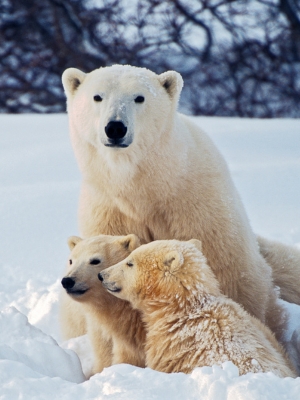A new group of monkeys has arrived at the API Primate Sanctuary. Recently released from a research facility, the group of bonnet macaques is settling into its new home in Southwest Texas.
[teaserbreak]
These monkeys, whose ages range from 1 to 20 years and include two elderly females with infants, were born in captivity and had been used either for breeding or for various behavioral research projects. Having spent their lives under laboratory conditions, their arrival at our Sanctuary means that for the first time these bonnet macaques are experiencing new sights, sounds, and smells in a natural environment.
A new spacious and enriched semi-natural enclosure was specially built by API Sanctuary staff for these macaques. The enclosure gives the monkeys space and height and contains trees, logs, and grass. It was divided into areas to allow for the various social groupings that reflected how the monkeys had been housed in the laboratory, although most of the monkeys were familiar with each other.
The first few days were a confusing time for the monkeys; after years of living in a laboratory environment to suddenly be in a strange and unknown environment — the open sky, the warmth of the sun, the smell of grass, the sounds of birds — all things we take for granted every day. When released into their new homes, most rushed out of the transit crates while others, more cautious, held back, first poking their heads out to survey their surroundings.
For the next week, the monkeys spent most of their time living in the upper part of their enclosure, apprehensive about walking across the soil and grass. Although they liked to eat the grass, they would initially not walk on it, so would hang by their feet from feeding shelves and rungs of ladders to pick grass with their outstretched arms. As their confidence grew they became bolder and ventured farther, although at first they walked cautiously across the grass, lifting their legs slowly as though walking through thick mud. Or they would dart down to pick something up off the ground before rushing back up again.
Gradually over a period of weeks, the various groups were introduced to each other and it was not long before they were living and interacting together as one social group with access to all areas of the enclosure. Their lives have now been further enriched by these new social networks and additional space. Nonhuman primates are resilient and adaptable animals and after a period of acclimation, all the monkeys are now actively exploring and enjoying their new environment. They spend their days eating, grooming, and playing with each other, clearly enjoying life, as free as they can be.
We are delighted to offer these individuals a new lease on life and are committed to providing lifelong care for them. Although the research institution provided some funds for the initial housing and care of these monkeys, API seeks public donations to eventually provide them a larger open-topped free-ranging enclosure. This will give them even more space and enrich their lives substantially, something they so deserve after years spent living under laboratory conditions.
 Dear Reader,
Dear Reader,